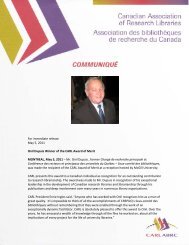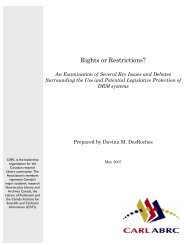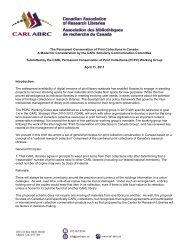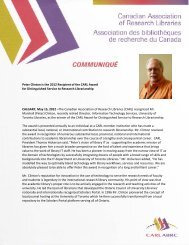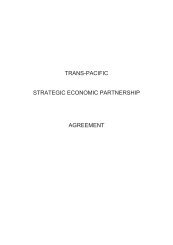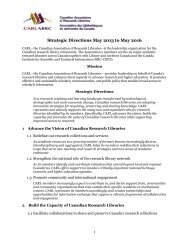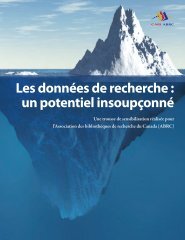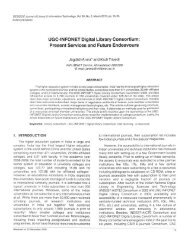PDF - CARL - ABRC
PDF - CARL - ABRC
PDF - CARL - ABRC
You also want an ePaper? Increase the reach of your titles
YUMPU automatically turns print PDFs into web optimized ePapers that Google loves.
importance of experimenting with models that will allow greater, more cost‐effective access to scientific<br />
and scholarly information. Groups such as the Association of American Universities, the Association of<br />
Research Libraries, the Coalition for Networked Information, the Scholarly Publishing and Academic<br />
Resources Coalition (SPARC), among others advocate for public access to federally‐funded research to<br />
bring national attention to the matter of a sustainable scientific information environment that is<br />
accessible to every citizen.<br />
Recognizing the worldwide momentum favoring the development of efficient and sustainable<br />
information systems that maximize the impact of public investment in scientific research , the [U.S.]<br />
Office of Science and Technology Policy (OSTP) issued a call in December 2009 for input regarding<br />
“Public Access Policies for Science and Technology Funding Agencies across the Federal Government”<br />
which garnered a tremendous amount of responses from organizations and individuals which the OSTP<br />
will analyze to craft policy recommendations 15 . On the heels of the OSTP’s request for feedback on<br />
public access policies, Rep. Mike Doyle (D‐PA) and a bi‐partisan host of co‐sponsors introduced the<br />
Federal Research Public Access Act of 2010 (FRPAA) in the U.S. House of Representatives on April 15,<br />
2010. The proposed bill would build on the success of the first U.S. mandate for public access to the<br />
published results of publicly funded research at the National Institutes of Health (NIH), and require<br />
federal agencies with annual extramural research budgets of $100 million or more to ensure the public<br />
benefits from online access to research article manuscripts stemming from funded research no later<br />
than six months after publication in a peer‐reviewed journal. The bill is seen by many to recognize the<br />
need and opportunity to use digital technology to increase the pace of innovation. 16<br />
Another arena where great strides in favour of open access are being made is in open digital<br />
repositories. There are over 1700 open digital repositories that collect and preserve the research<br />
outputs of universities and research centres worldwide 17 . Research funders, universities and other<br />
institutions have thus far adopted over 200 hundred open access mandates. In the United States, faculty<br />
at Harvard University, MIT, the University of Kansas, and Duke University have adopted institutional<br />
mandates requiring researchers to deposit copies of article manuscripts, accepted for publication in<br />
peer‐reviewed journals, in the open digital repositories of their institutions. 18<br />
The Confederation of Open Access Repositories (COAR) established in October 2009, and of which <strong>CARL</strong><br />
is a founding member, embodies significant support for open access internationally. With members<br />
from over 25 countries around the world, COAR seeks to establish a “global network of open access<br />
digital repositories to enhance the wide visibility and applicability of research outputs.” Some of its<br />
activities are to lobby for repositories, their networks, and repository‐based cyberinfrastructure at<br />
15<br />
Office of Science and Technology Policy, Public Access Policy Update, March 8, 2010<br />
http://www.whitehouse.gov/blog/2010/03/08/public‐access‐policy‐update<br />
16<br />
Alliance for Taxpayer Access, Congress takes another stride toward public access to research, April 15, 2010<br />
http://www.taxpayeraccess.org/news/news_releases/10‐0415.shtml<br />
17<br />
Registry of Open Access Repositories (ROAR) http://roar.eprints.org/<br />
18<br />
Registry of Open Access Repository Material Archiving Policies (ROARMAP)<br />
http://www.eprints.org/openaccess/policysignup/<br />
7



